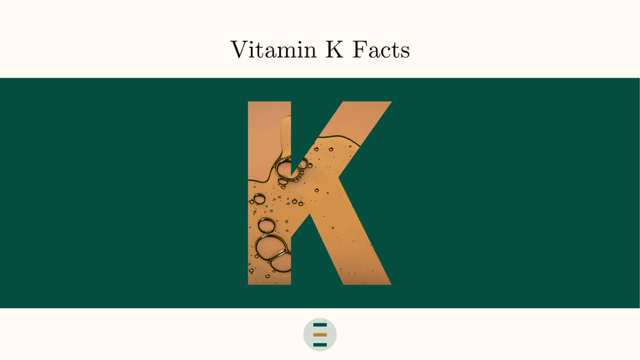Have you ever heard of the “forgotten vitamin”? Vitamin K is often overshadowed by more well-known vitamins, but don’t let that fool you – this nutrient is an unsung hero when it comes to maintaining your overall health. From promoting bone and heart health to supporting brain function and preventing blood clotting disorders, vitamin K is a powerhouse nutrient that should not be overlooked. In this blog post, we will dive into the exciting world of vitamin K, exploring its various forms, and benefits, and uncovering why this often-overlooked nutrient is a must-have for your daily supplement routine. Get ready to fall in love with vitamin K!
Vitamin K is a fat-soluble vitamin that is essential for clotting in the blood. It also plays a crucial role in maintaining bone and cardiovascular health. Symptoms of vitamin K deficiency may include excessive bleeding or bruising. In severe cases, internal bleeding may occur, which can be life-threatening. Additionally, vitamin K deficiency may increase the risk of bone fractures and osteoporosis, as the nutrient is important for healthy bone metabolism.
There are two main forms of vitamin K: vitamin K1 (phylloquinone) and vitamin K2 (menaquinone). While both forms are important for overall health, they have different roles in the body.
Vitamin K1 is primarily found in leafy greens such as spinach, kale, and broccoli, as well as in some vegetable oils. It plays a crucial role in blood clotting, helping to activate certain proteins that are involved in the coagulation process.
Vitamin K2, on the other hand, is mainly found in animal-based foods such as meat, eggs, and dairy products, as well as in fermented foods such as natto and cheese. Vitamin K2 is important for bone health, as it helps to activate proteins that promote bone mineralization. Additionally, some research suggests that vitamin K2 may play a role in heart health, helping to prevent calcium buildup in the arteries.
While both forms of vitamin K are important for overall health, some research suggests that vitamin K2 may be more important to supplement than vitamin K1. This is mainly due to vitamin K2’s role in bone and cardiovascular health.
Vitamin K2 is the main form of vitamin K found in the tissues of the body, particularly in the bones and arteries. It activates a protein called osteocalcin, which helps to promote bone mineralization and prevent bone loss. Additionally, vitamin K2 has been shown to play a role in cardiovascular health by preventing the buildup of calcium in the arteries, which can lead to atherosclerosis and other cardiovascular diseases.
If supplementing with high doses of Vitamin D, it is so important to have K2 apart of the regimen. While vitamin D helps the body absorb calcium, vitamin K2 helps to direct that calcium to the bones where it is needed, and away from the arteries where it can contribute to cardiovascular disease.
When vitamin D levels are low, the body may release calcium from the bones to maintain blood calcium levels, which can weaken the bones and increase the risk of fractures. However, when vitamin D is taken with vitamin K2, the calcium absorbed by the body is more likely to be directed towards the bones, promoting bone health and reducing the risk of osteoporosis.
Additionally, some studies have suggested that taking vitamin D and vitamin K2 together may have a synergistic effect on cardiovascular health. Vitamin D has been shown to help lower blood pressure and reduce the risk of heart disease, while vitamin K2 helps prevent calcium buildup in the arteries, which can lead to atherosclerosis and other cardiovascular diseases.
Therefore, taking vitamin K2 with vitamin D may be beneficial for those looking to support bone and cardiovascular health. It is important to note that supplementation should be done under the supervision of a healthcare provider, as high doses of these nutrients can have harmful effects.
On the other hand, vitamin K1 is primarily involved in blood clotting, although it may also have a role in bone health. However, studies have suggested that vitamin K2 is more effective at promoting bone health than vitamin K1, particularly in postmenopausal women who are at a higher risk of osteoporosis.
Vitamin K may not be the first thing that comes to mind when we think of essential vitamins, but its role in our health should not be underestimated. It is required in maintaining strong bones, blood clotting, and cardiovascular health. Without vitamin K, we are at greater risk of osteoporosis and other bone diseases. Therefore, supplementation with vitamin K2 is essential for those looking to support bone and cardiovascular health. Remember, your health is your most important asset, and any effort toward taking care of your health is always worth it. Cheers to YES!

